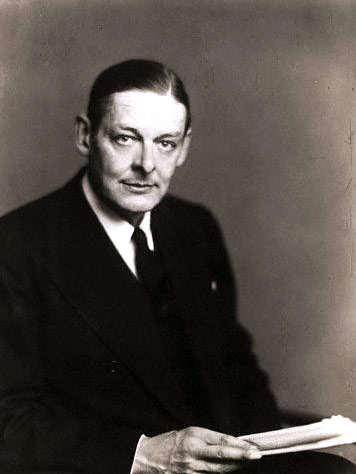
In my continuing internal debate about the merits of Formalist criticism, I came across an interesting article discussing the relationship between T.S. Eliot and Modernism. "T.S. Eliot and Modernity", written by Louis Menand, begins to assess the relationship between the Modernist movement and Eliot. Menand writes,
Eliot never courted the academy; he took the opportunity, on various occasions, of insulting it. But the modern academy, at a crucial moment in its history, made an icon of Eliot. And this suggests that the answer to the question of Eliot's success is likely to be found not simply in what he had to say but also in the institutional needs his writing was able to serve.Menand raises an interesting point. In our last several classes of Literary Criticism, we've discussed Eliot, his ideas, and his influence. And yet, in Menand's view at least, Eliot despised the institutions of higher learning. The paradoxical nature of Eliot is intriguing - Menand goes on to write that Modernism, as Eliot knew of it, was a reaction against the modern. And so the paradox continues. Or does it?
In Menand's view, romantic ideas still persisted in Eliot's culture of modernity, a situation which Eliot found deplorable. Certainly, Eliot's writing does seem to be reacting strongly against Emerson's Romanticism. Eliot focuses on literary technique over divine intervention, and form over content. And yet, there continues to be something in Eliot's writing that remains paradoxical, or even suspect.
Every writer has their own beliefs and experiences which invade their writing, no matter how much they might wish for their writing to be devoid of personal biography. For Eliot to argue otherwise is, in my opinion, nonsensical. Certainly, there may be overly sentimental or biographical poems which may not be worthy of study, yet it seems impossible that any writer, ever, can be completely unaffected by their personal experiences.
Ultimately, there seems to be some sort of impossible paradox in Eliot's writing. Menand writes that Eliot's criticism and writing were admittedly ad hoc in that they were writing criticism which applied to their own writing. For me, however, Eliot's criticism goes beyond simply ad hoc. While Eliot certainly offered valuable ideas for readers to consider while reading poetry, I ultimately find his writing to be to paradoxical to put much stock in.
1 comment:
T.S. Eliot is one of the great thinkers on modernity of all time ... He dedicated himself to write the greatest minds in relation to world powers and modernity
Post a Comment